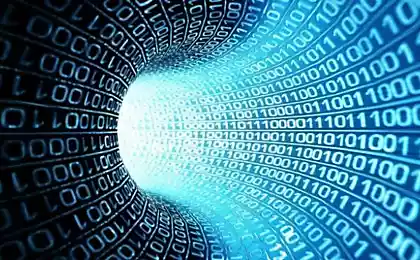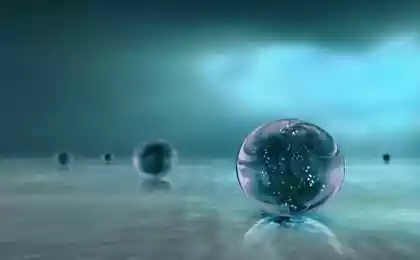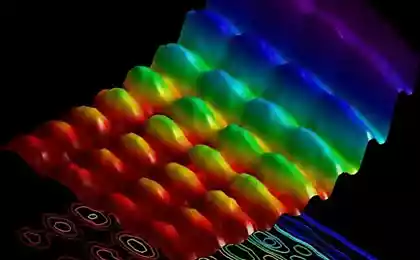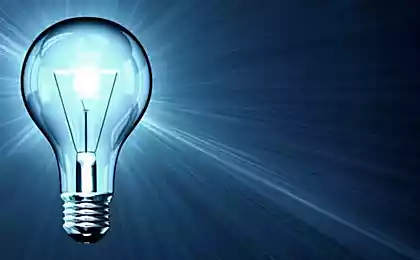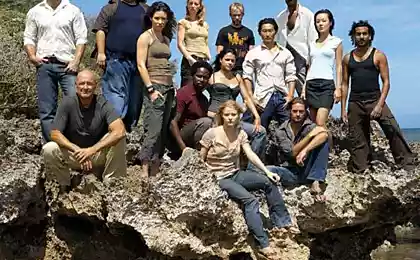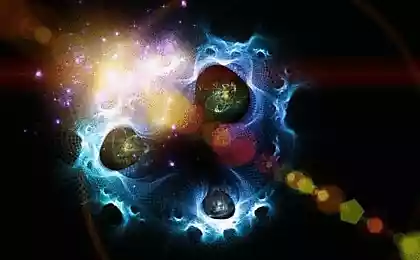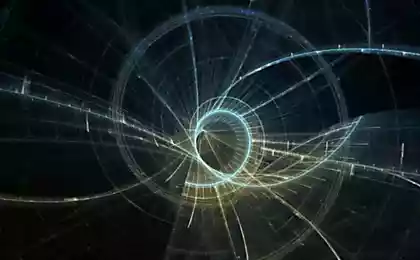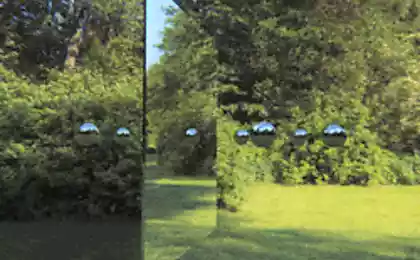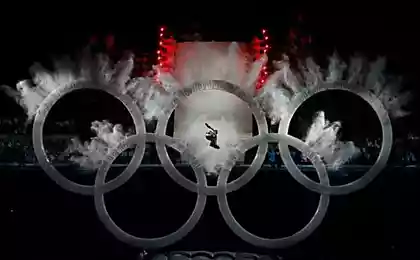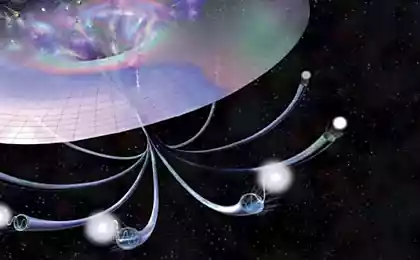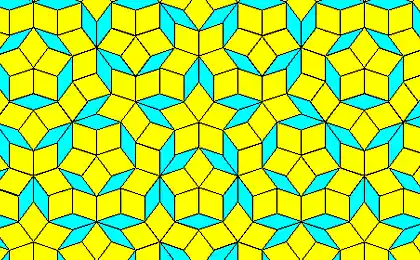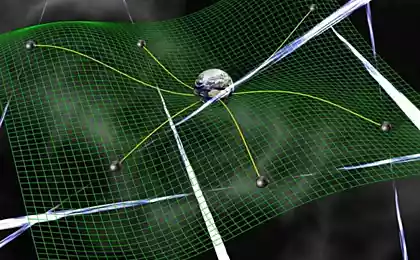569
In the quantum world the future affects the past
Fifty six million three hundred ninety four thousand two hundred fifty four
The experiment showed that the analysis of the past and future of a quantum system, "predicts" her condition more accurately than simply an analysis of the future. Difficult? Let's face it. We are so used to detective stories that don't even notice how the author plays with time. Typically the murder occurs until the middle of the book, but the reader can see only black spot, and, as a rule, he learns what happened, only on the last page.
If you pry from the book to the last page, according to physicist Boat March from Washington University in St. Louis, as the reader will better understand what happened: after reading until a torn page or read the entire book? The answer is all too obvious in the case of a detective, but not so easy in the world of quantum mechanics, where uncertainty is fundamental, not attracted to the joy of reading.
Even if you know everything quantum mechanics can describe quantum particle, says Murch, you can confidently predict the outcome of a simple experiment to measure its state. All that has to offer quantum mechanics is a statistical probability of possible outcomes.
Conventional wisdom says that this uncertainty is not a defect of the theory, but rather a fact of nature. The state of a particle not only unknown, but truth is not determined before the measurement. The act of measurement itself causes particles to collapse to a specific state.
In the journal Physical Review Letters, which will be held February 13, March Cather describes a method to narrow the chances of successful definition. By combining information on the evolution of a quantum system after a point of reference with information about its evolution up to that time, a physicist in the lab could narrow the chances for correct definition of the system state from 50/50 to 90/10.
It's as if what we did today, yesterday changed. And as follows from this analogy, the results of the experiment are terrible value for the time and causation — at least in the microscopic world of quantum mechanics.
Measurement of pantomath recently physicists could explore the quantum mechanical properties of individual particles only in the process of thought experiments, because any attempt to observe them directly led to the fact that the particles hid their mysterious quantum properties.
In 1980-90 years physicists have invented a device that allows them to measure these fragile systems so carefully that they do not suddenly collapse to a certain state. The device, which used the March, is a simple superconducting circuit that enters quantum space when it is cooled almost to absolute zero. The Marcha team used two lowest energy levels of the cube, basic and excited state, in their model quantum system. Between these two States there are an infinite number of quantum States, which represent the superposition, or a combination of the ground and excited States.
The quantum state of the circuit by placing it in a microwave box. A few microwave photons are sent in a box where their quantum fields interact with a superconducting loop. When the photons leave the box, they carry information about the quantum system.
It is important to note that these "weak" neresnytsya measurement does not disturb the qubit, unlike "strong" measurements with photons that are in resonance with the energy difference between two States knocks the chain in one or another state.
Quantum ugadayka work, Murch describes a quantum guessing game with the qubit:
"Every time we start with the premise of a qubit in a superposition of two States, he says. — Then we perform a strong measurement but hide the result, continuing to observe the system with weak measurements."
Then scientists try to guess the hidden result, like the version of the murder, which remained on the torn page of a detective.
"For the future application of the born equation, which Express the probability of finding the system in a particular state, guarantee you the chances of a correct response in 50% of cases, — says Murch. But you can also find him on the contrary, using a specific matrix effect. Just take all the equations and turn. They will work and you can just run the trajectory backward."
"So, if you look at the reverse and a moving trajectory, and evaluate their information equally, we will get a forecast in hindsight, or retrodiction".
Interesting in this retrograde (instead of forecast) that it is 90% accurate. When physicists have tested it on a saved measurement of early system state, they can win 9 times out of 10.
Down the rabbit niecantly guessing can be useful in the development of quantum computers and quantum control of open systems such as chemical reactions, making them more reliable. It can also have consequences for the deeper problems in physics.
On the one hand, it suggests that in the quantum world, time flows backward and forward whereas in the classical world it only flows forward.
"I always thought that the measurement must address the question of temporal symmetry in quantum mechanics, — says Murch. — If we measure a particle in a superposition of States and collapses it in one of two States, well, it seems that this process — the movement of time forward."
But the experiment with quantum guessing returned time symmetry. Improved chances of the forecast mean that the quantum state somehow combines information from the future and the past. And that means time in the quantum world presents a double-headed arrow.
"It is not clear why in the real world, consisting of many particles, time only goes forward and entropy always increases, — says Murch. But many are working on this problem, and I think it will be solved in a couple of years."
However, is there in a world where time is symmetrical, things like cause and effect? To find out, March offers to run an experiment with the qubit, which will create feedback loops (chains of causes and effects) and try to run them forward and backward. "On one such experiment will take 20-30 minutes, a few weeks for analysis and year-to-scratching turnip and trying to understand, we've gone crazy or not. In any case, I am comforted by the fact that we have a real experiment and real data".
Source: hi-news.ru
The experiment showed that the analysis of the past and future of a quantum system, "predicts" her condition more accurately than simply an analysis of the future. Difficult? Let's face it. We are so used to detective stories that don't even notice how the author plays with time. Typically the murder occurs until the middle of the book, but the reader can see only black spot, and, as a rule, he learns what happened, only on the last page.
If you pry from the book to the last page, according to physicist Boat March from Washington University in St. Louis, as the reader will better understand what happened: after reading until a torn page or read the entire book? The answer is all too obvious in the case of a detective, but not so easy in the world of quantum mechanics, where uncertainty is fundamental, not attracted to the joy of reading.
Even if you know everything quantum mechanics can describe quantum particle, says Murch, you can confidently predict the outcome of a simple experiment to measure its state. All that has to offer quantum mechanics is a statistical probability of possible outcomes.
Conventional wisdom says that this uncertainty is not a defect of the theory, but rather a fact of nature. The state of a particle not only unknown, but truth is not determined before the measurement. The act of measurement itself causes particles to collapse to a specific state.
In the journal Physical Review Letters, which will be held February 13, March Cather describes a method to narrow the chances of successful definition. By combining information on the evolution of a quantum system after a point of reference with information about its evolution up to that time, a physicist in the lab could narrow the chances for correct definition of the system state from 50/50 to 90/10.
It's as if what we did today, yesterday changed. And as follows from this analogy, the results of the experiment are terrible value for the time and causation — at least in the microscopic world of quantum mechanics.
Measurement of pantomath recently physicists could explore the quantum mechanical properties of individual particles only in the process of thought experiments, because any attempt to observe them directly led to the fact that the particles hid their mysterious quantum properties.
In 1980-90 years physicists have invented a device that allows them to measure these fragile systems so carefully that they do not suddenly collapse to a certain state. The device, which used the March, is a simple superconducting circuit that enters quantum space when it is cooled almost to absolute zero. The Marcha team used two lowest energy levels of the cube, basic and excited state, in their model quantum system. Between these two States there are an infinite number of quantum States, which represent the superposition, or a combination of the ground and excited States.
The quantum state of the circuit by placing it in a microwave box. A few microwave photons are sent in a box where their quantum fields interact with a superconducting loop. When the photons leave the box, they carry information about the quantum system.
It is important to note that these "weak" neresnytsya measurement does not disturb the qubit, unlike "strong" measurements with photons that are in resonance with the energy difference between two States knocks the chain in one or another state.
Quantum ugadayka work, Murch describes a quantum guessing game with the qubit:
"Every time we start with the premise of a qubit in a superposition of two States, he says. — Then we perform a strong measurement but hide the result, continuing to observe the system with weak measurements."
Then scientists try to guess the hidden result, like the version of the murder, which remained on the torn page of a detective.
"For the future application of the born equation, which Express the probability of finding the system in a particular state, guarantee you the chances of a correct response in 50% of cases, — says Murch. But you can also find him on the contrary, using a specific matrix effect. Just take all the equations and turn. They will work and you can just run the trajectory backward."
"So, if you look at the reverse and a moving trajectory, and evaluate their information equally, we will get a forecast in hindsight, or retrodiction".
Interesting in this retrograde (instead of forecast) that it is 90% accurate. When physicists have tested it on a saved measurement of early system state, they can win 9 times out of 10.
Down the rabbit niecantly guessing can be useful in the development of quantum computers and quantum control of open systems such as chemical reactions, making them more reliable. It can also have consequences for the deeper problems in physics.
On the one hand, it suggests that in the quantum world, time flows backward and forward whereas in the classical world it only flows forward.
"I always thought that the measurement must address the question of temporal symmetry in quantum mechanics, — says Murch. — If we measure a particle in a superposition of States and collapses it in one of two States, well, it seems that this process — the movement of time forward."
But the experiment with quantum guessing returned time symmetry. Improved chances of the forecast mean that the quantum state somehow combines information from the future and the past. And that means time in the quantum world presents a double-headed arrow.
"It is not clear why in the real world, consisting of many particles, time only goes forward and entropy always increases, — says Murch. But many are working on this problem, and I think it will be solved in a couple of years."
However, is there in a world where time is symmetrical, things like cause and effect? To find out, March offers to run an experiment with the qubit, which will create feedback loops (chains of causes and effects) and try to run them forward and backward. "On one such experiment will take 20-30 minutes, a few weeks for analysis and year-to-scratching turnip and trying to understand, we've gone crazy or not. In any case, I am comforted by the fact that we have a real experiment and real data".
Source: hi-news.ru
Romantic Breakfast: pancakes from Oleg Ilyin
Shades of grey: a stylish interior without redevelopment

